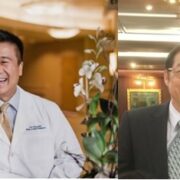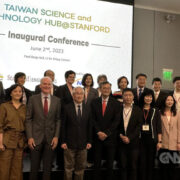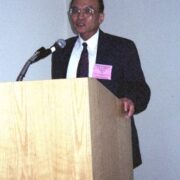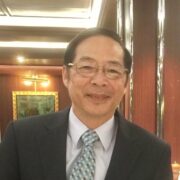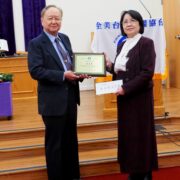In memory of Dr. Edward Cheng
Edward Teh-Chang Cheng 1946-2015
Author Wendy Cheng
Edward Teh-Chang Cheng (鄭德昌) was born on November 23, 1946 in Pingtung, Taiwan and passed away on May 31, 2015, in Rancho Santa Fe, California. He was the fifth of six children born to Cheng Shui-Ping (鄭水平), an architect, and Li Tsai-Ying (鄭李財英), a homemaker. As a child, he loved to eat bananas, and did very well in school, despite skipping it occasionally to go watch movies with his best friends. Although his mother wanted him to go to medical school, he selected nuclear engineering as his first choice instead, and was accepted at Tsinghua University in Hsinchu. During his senior year there, he reluctantly woke up early one morning at the coaxing of a friend to go help coach a pretty, freshman physics major, Shu-Ching (賴淑卿), in tennis. It turned out that she did not need any coaching from them; however, the moment he saw her, he would say later that he knew “something would happen. They were both active in the mountaineering club, of which he was the founder and captain, and climbed some of the highest mountains in Taiwan. He received both his bachelor’s and master’s degrees in nuclear engineering from Tsinghua, completed his compulsory military service, and left for the United States to enroll as a Ph.D. student at the University of Wisconsin, Madison, in August, 1972.
He and Shu-Ching were married in June, 1973. Their son, Eric Hauh (鄭皓), was born in 1975, followed by a daughter, Wendy Hsin (鄭昕), in 1977. While living in Madison, he and Shu-Ching were also active in the Wisconsin Taiwanese Association, of which he served as president from 1975-1976. He completed a dissertation on fusion energy, “Application of Variational Methods to Fusion Reactor Blanket Studies,” under the guidance of Professor Bob Conn, and earned a Ph.D. in nuclear engineering in 1976. He had wanted to become a professor, but his leadership in the Taiwanese Association put him on the Kuomintang blacklist in Taiwan, and opportunities in the US for a foreign candidate in a highly specialized field were scarce. Instead, he accepted a job with General Atomics as a research scientist, and the family moved to San Diego in August, 1978, driving from Wisconsin for ten days with two young children and Shu-Ching’s brother, Jen-Jong, in the car as well. The family lived first in Clairemont, and then moved to the coastal, North County suburb of Del Mar in 1981. In 1987, they moved to Rancho Santa Fe, where they would stay. Edward especially loved the privacy and the orange grove in the Rancho Santa Fe house.
During these years, Edward was part of the international fusion research community and made many friends. He attended numerous international conferences and symposia and visited most of the leading nuclear energy research centers in the world. A trip to Berlin soon after the fall of the Berlin Wall in particular made a strong impression on him. In 1987, martial law was finally lifted in Taiwan, and in 1989, Edward and Shu-Ching were able to return to Taiwan for the first time in over ten years, and for the first time with both of their children.
The couple continued to be actively involved in the Taiwanese community. From 1979 to 1980, Edward served as the secretary of the Formosan Association for Human Rights, which was then headquartered in San Diego. He was a board member of the Taiwanese American Foundation of San Diego for twelve years, and started and chaired the Taiwanese culture and history lecture series held at the Taiwanese American Community Center for many years. The series included renowned speakers such as novelists Lee Chiao (李喬), Tzeng Ching-wen (鄭清文), and Huang Chuan (黃娟). Edward and Shu-Ching were also instrumental in establishing the Lai Ho & Wu Cho-liu Endowed Chair in Taiwan studies at UC Santa Barbara. Poet and scholar Tu Kuo-ching (杜國清), the first holder of the chair, reflected on its significance in a poem inspired by an evening at the Chengs’ house, “Viewing the Night-Blooming Cereus”:
The scent of night-blooming cereus grows ever stronger
in the deepening night a Southern California summer night
with a pressing chill in the air as we continue to chat
unreservedly of how life began to blossom
and bear fruit after emigrating abroad
How the native literature of Taiwan
is striking root in the United States
In 1990, Edward left General Atomics to work independently as a research scientist, which he did from an office in Solana Beach until retiring in 2006. Beginning in the early 2000s, he started to write poetry and essays, acting upon a longtime interest that he had previously not been able to realize. He wrote in Chinese, in a modem, freeform style. His favorite topics included his childhood, science and philosophy, nature, and the history and politics of Taiwan. In 2005, he published his first book of poems, 綠色瞬間 (The Green Flash), which also included photographs. In 2014, he published a second book, 練習詩 (Practice Poems), which included over 150 poems, photographs by his son and daughter, and an appendix of English translations. In these years, he particularly valued his friendship with and the encouragement of poet Li Min-yong (李敏勇), writer Tzeng Ching-wen (鄭清文), and Tzeng’s daughter, Angela Tzeng (鄭谷苑), a psychology professor.
Edward was well loved by his family, friends, and many in the Taiwanese community for his knowledge, intelligence, unusual worldview, and unique sense of humor. He loved making jokes with friends and especially younger family members, drinking beer and eating sausage (tastes developed from his time in Wisconsin), and Snickers bars. He was also fond of playing the slot machines at Pala Casino. In his later years, one of his favorite activities was to walk in the orange grove and smell the orange blossoms in the spring, or admire the camellias and night-blooming cereus at home while drinking wine and talking with friends.
In 2013, he was diagnosed with late-stage lung cancer. He spent his last two years undergoing multiple rounds of treatment, completing his second poetry book, and spending time with family and friends. He passed away peacefully at home, surrounded by his family. Edward Cheng is survived by his wife Shu-Ching; son Eric, his wife Pam, and their son Mako Edward; and daughter Wendy and her partner Juan. He will be dearly missed.
Orange Blossom Season
by Edward Cheng (2014)
Orange blossom season
arrived early this year;
in the warmth of early spring,
white blossoms against a bright, blue sky.
Every year, the sweet fragrance of wine
accompanied friends, grand aspirations;
walking in the orange-scented grove
this year, I wonder, is anyone here?
Every year, the orange blossoms come.
They never get old, but the trees are getting old;
each year, one blooms while the other ages.
Orange grove, in the future, where will you be?
橘子花開的季節
橘子花開的季節, 今年來得特別早; 溫暖的早春看著, 燦爛淡藍的天空。
想起每年的酒香, 朋友的豪情壯志; 走在橘香的園地, 不知今年有誰在?
橘花橘花年年開, 開花不老樹會老; 年年開花年年老, 橘園橘園將何在?
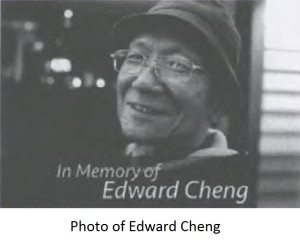 From Newsletter July/2015/Taiwanese American Association/San Diego
From Newsletter July/2015/Taiwanese American Association/San Diego

